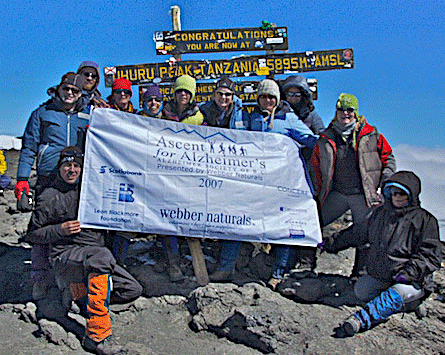BCMA supports Alzheimer’s research

On 17 September 2007, BCMA’s ScotiaMcLeod fund manager Don Bulmer and 10 other climbers reached the summit of Mount Kilimanjaro. The climb was the culmination of many months of training, conditioning, and tireless fundraising to reach a total of $220000 in donations for the Alzheimer Society.
The BCMA supported Don in his fundraising efforts by donating $5000 to the cause, which was then matched by Don’s employer, ScotiaMcLeod, through the Scotia Match program. Although these donations gave him the required fundraising amount of $10000 needed to participate in the Ascent for Alzheimer’s, Don kept working, raising an individual total of $90000 for the event and far surpassing his original fundraising goal of $75 000. Participants in the climb pay for their own expenses, about $6000.
The Alzheimer Society requires that a physician accompany the team on the climb, and last year it happened to be a BCMA member, Dr Dan Dibski of Chilliwack, who donated his time and the cost of his travel expenses in order to participate.
After months of preparation as a team, including local hikes and climbs organized in advance to condition participants for the challenges ahead, the climbers and Dr Dibski traveled to Tanzania to embark on their climb of Kilimanjaro.
Team members taking part in the ascent found themselves united not only by their training and the journey, but also by their commitment to those suffering from dementia.
Don describes his own participation in the ascent as having given him a window into what his grandmother, who died at age 56 from Alzheimer-related complications, must have suffered in battling the disease. He describes how altitude sickness has parallels to dementia in its symptoms of disorientation and confusion, and also in its random aspect: similar to dementia, you never know who in your group is going to be affected by altitude sickness while on a climb (in this case the team physician, Dr Dibski, fell ill).
During the grueling final hours of the climb, Don found strength in the knowledge that he was battling through the same symptoms as his grandmother in order to reach the summit for the cause.
While the team trained for the climb in a series of hikes in the North Shore mountains and the Whistler area, nothing could truly prepare them for the conditions in the final push for the summit. One climber described the ascent as comparable to doing the Grouse Grind three times consecutively, but at high altitude and with little sleep and no food.
It was snowing and dark when the climbers left their camp at 15400 feet and began slowly ascending to the summit. The sky cleared as they walked, and they hiked under the stars for several hours, reaching the 19340-foot summit at dawn to see the sun rise over Africa, which Don remembers as the most amazing moment of the journey.
Through supportive teamwork, ample assistance from a team of 36 porters, and a slow ascent (7 days rather than the standard 4 days, to allow for better acclimatization), all climbers in the group were able to reach the summit. Their 100% success rate is outstanding considering that only 50% of all climbers who attempt the ascent each year successfully reach the summit.
Climbing Mount Kilimanjaro marked the pinnacle of Don’s mountain-climbing career—he is quick to say that he’s done with altitude. However, Don will carry on fundraising for charitable causes, hoping to keep up his goal of supporting one cause per year, and he continues to enthusiastically support his clients at ScotiaMcLeod in charitable gift planning and the attainment of their own philanthropic goals.
The 2007 Ascent for Alzheimer’s marked the 10th anniversary of the climb. Notable past participants include Premier Gordon Campbell, who made the ascent with his family in 1999 when he was opposition leader, and Dr Danuta Skowronski of the BC Centre for Disease Control.
If you are a physician interested in participating in or volunteering for the Ascent for Alzheimer’s, please contact Alzheimer Society special events officer Sandra Girard at SGirard@alzheimerbc.org, or call 604 742-4920. Alternatively, contact Don Bulmer at ScotiaMcleod at don_bulmer@scotiamcleod.com, or call 604 717-5500.
—Tara Lyon
BC Medical Journal
